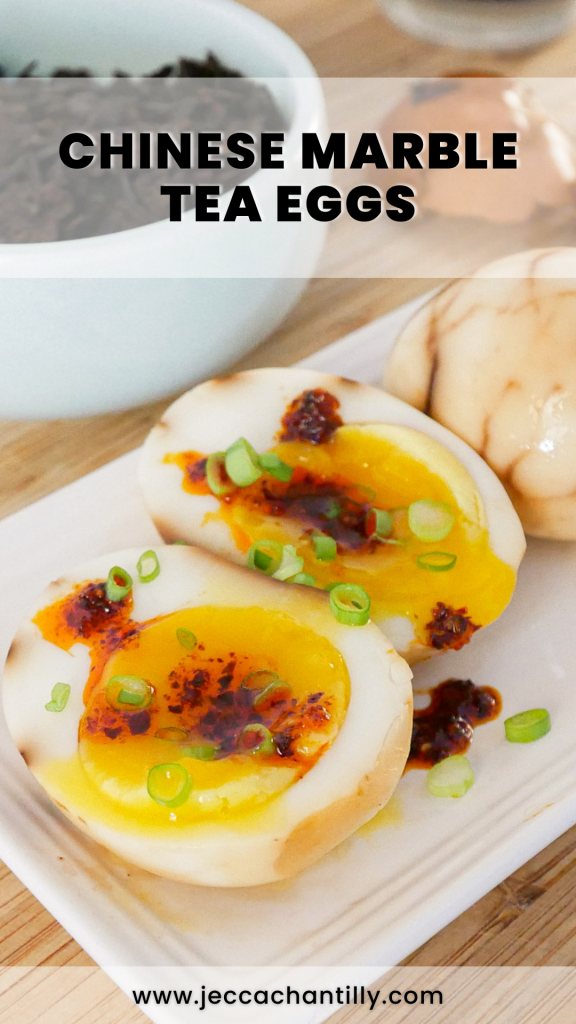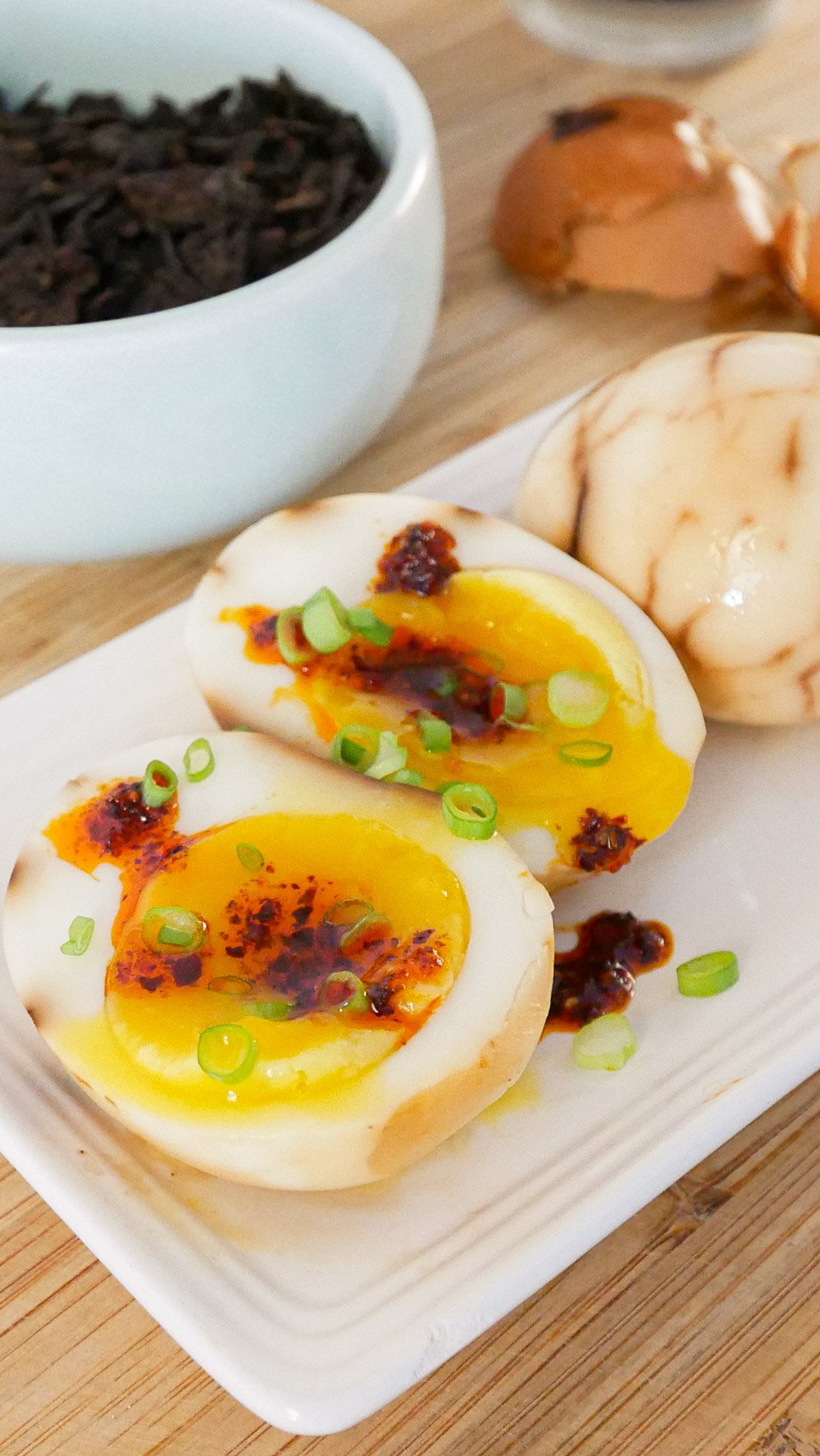Chinese tea eggs were one of my favorite childhood street food snacks! I remember going to this hole-in-the-wall spot every day after summer school in Flushing to get them. They would be served warm in a small plastic bag so you can throw the shells and bag out when you’re done.
What I liked most about their tea eggs was that they weren’t overly salty. The eggs had the perfect amount of flavor and saltiness, which was my inspiration for this recipe! These tea eggs are typically braised in a soy sauce-based mixture for hours, which ultimately results in chalky and rubbery yolks. In my opinion, it’s comparable to an overcooked well-done steak and I knew I could do better.
So instead of hard-boiled eggs, I’ve decided to cook them until they’ve become soft with jammy yolks on the inside. Plus, marinating them overnight in the soy sauce mixture really helped the eggs soak in all of those incredibly delicious flavors. I’m really happy that I got pretty close to the flavor profile of how my childhood snack tasted like!
Feel free to make a batch and let it sit in your fridge for up to 4 days. Just keep in mind that the longer it marinates, the more flavorful and salty the eggs will be. Aside from that, I hope you enjoy my tea egg recipe! 😊
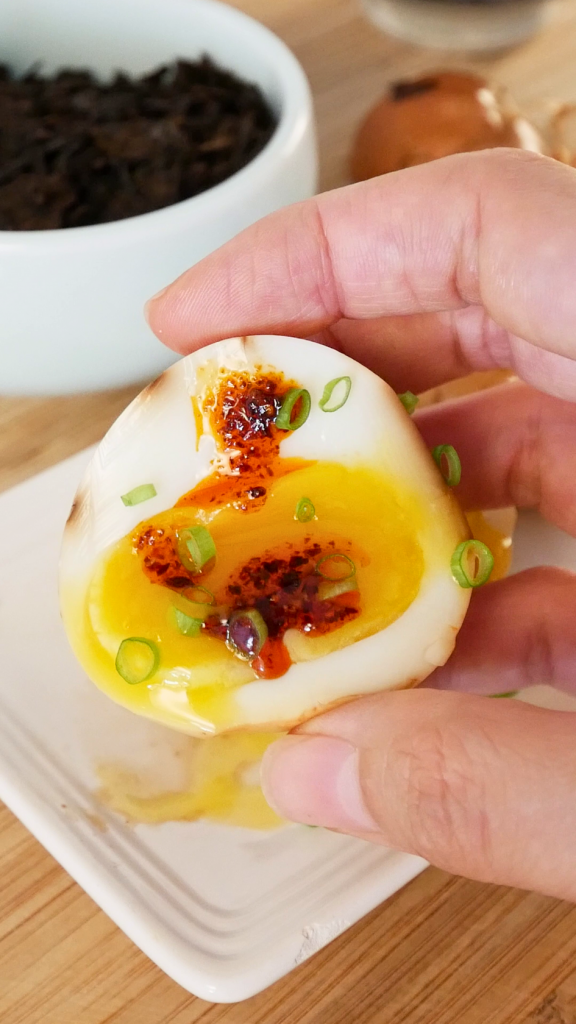
Why you’ll love this recipe
The great thing about this recipe is it will only take you about 15 minutes to make, and the hardest part is waiting for them to marinate. But don’t worry, your patience will soon be rewarded with a delightfully satisfying snack! The steps to prepare these tea eggs are so easy, that you’ll want to have them stocked in your fridge! Most of the ingredients are also pantry-friendly, so you can readily whip these up whenever you like.
Aside from a tasty snack, you can serve these eggs for breakfast on avocado toast or top them on a steaming bowl of ramen.
Don’t forget to admire the marbling design on the eggs once you peel off the shells!
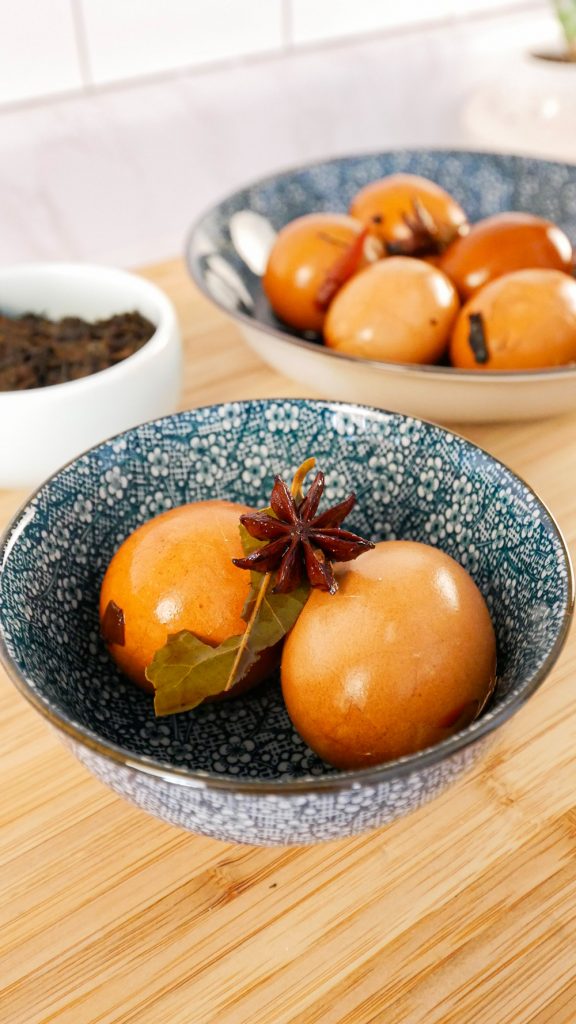
Chinese Tea Eggs Ingredients & Substitutions
Eggs: since the eggs are the star of the recipe, it’s important to use the highest quality eggs you can find!
Ginger: it can be difficult to replicate the spicy flavor of fresh ginger, so the closest substitute is ground ginger.
Garlic: the garlic adds a beautiful aroma to the sauce. Feel free to add a couple more!
Star anise: the star anise gives the tea eggs a particular licorice flavor and fragrance. But you can also substitute it with anise seed or Chinese five spice.
Cinnamon stick: a cinnamon stick will add an earthy flavor to balance out the soy sauce mixture and it doesn’t hurt that it adds an incredible aroma. If you don’t have any cinnamon sticks, you can also use ground cinnamon.
Dried bay leaves: the bay leaves also add a subtle aroma to the soy sauce mixture, but you can also leave them out or substitute them with thyme leaves.
Black tea leaves: the black tea leaves help deepen the color and impart a beautiful herbal flavor. You can also use any type of black tea that you prefer, including Pu Erh tea or oolong tea. Personally, I love using Pu Erh tea! If you don’t have any loose-leaf tea, a tea bag will also work.
Sichuan peppercorns: the Sichuan peppercorns build the spice in the soy sauce mixture, but you can also use black peppercorns.
Low-sodium soy sauce: you can also replace low-sodium soy sauce with regular soy sauce, but reduce the amount added by half.
Dark soy sauce: the dark soy sauce helps add a darker color but you can also substitute it with regular sauce.
Dried chili: I prefer using Chinese dried red chilies but you can also use any chili you like, including Thai chili peppers, serrano peppers, or jalapeno peppers.
Sugar: the sugar helps to balance out the saltiness from the marinade. You can substitute sugar with Chinese rock sugar or honey.
Salt: feel free to adjust the salt based on your preferences.
Water: the addition of water will dilute the marinade so it’s well-balanced.
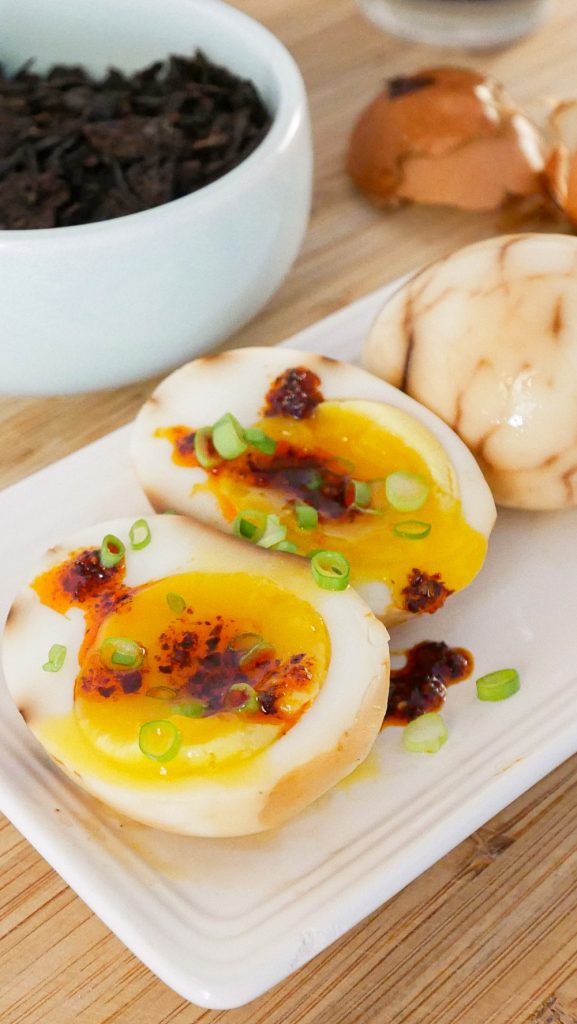
How do I prepare Chinese Tea Eggs?
Trust me when I say this – these Chinese tea eggs will taste best when they’ve spent a few days marinating in the soy sauce mixture. To begin preparing them, just follow these simple steps below:
Step 1: Boil the eggs
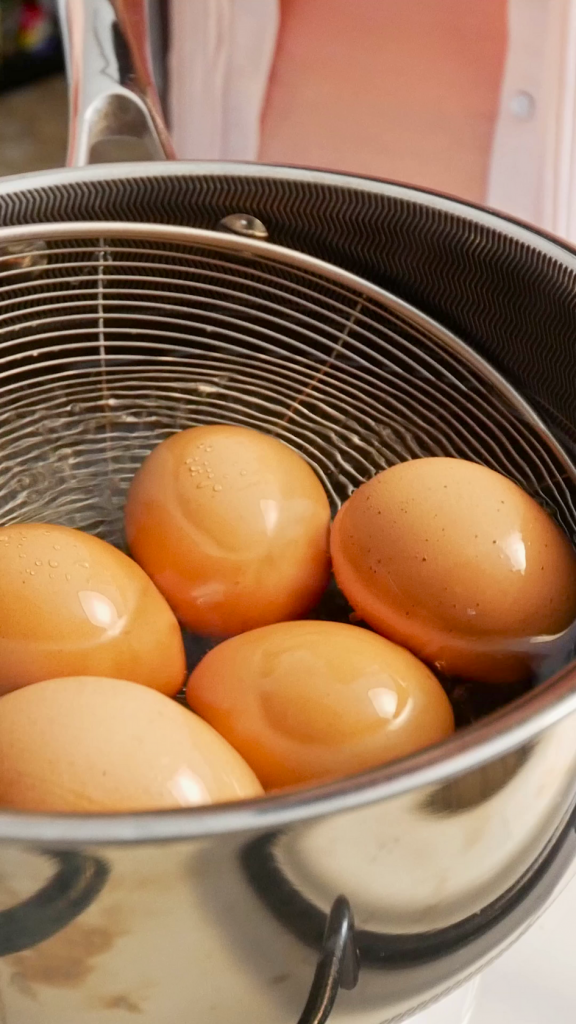
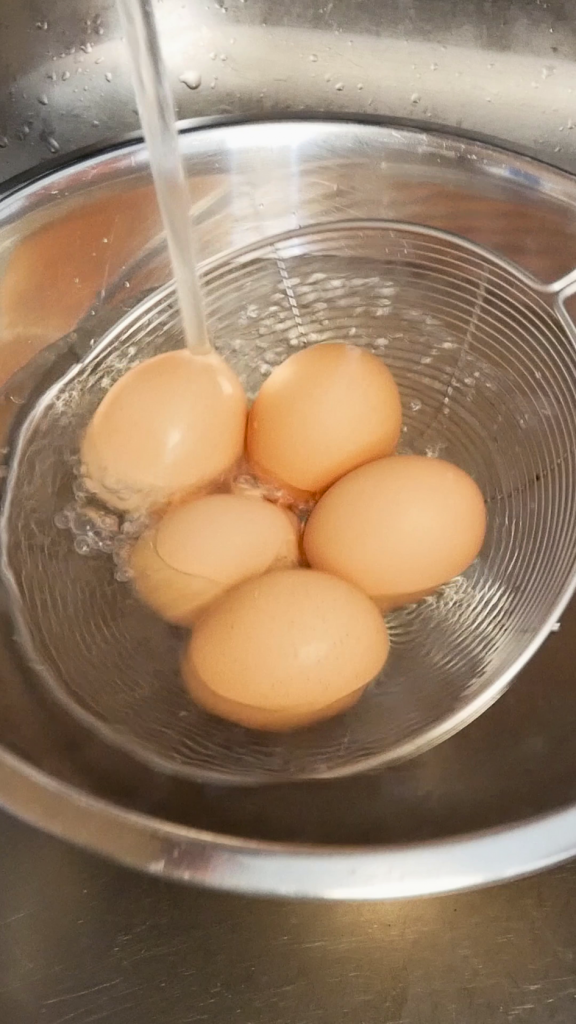
Bring a pot of water to boil over medium heat. Next, add eggs and boil for 7 minutes or to your desired doneness. Once the time is up, transfer the eggs into an ice bath or into a bowl under running cold water.
Step 2: Make the soy sauce mixture
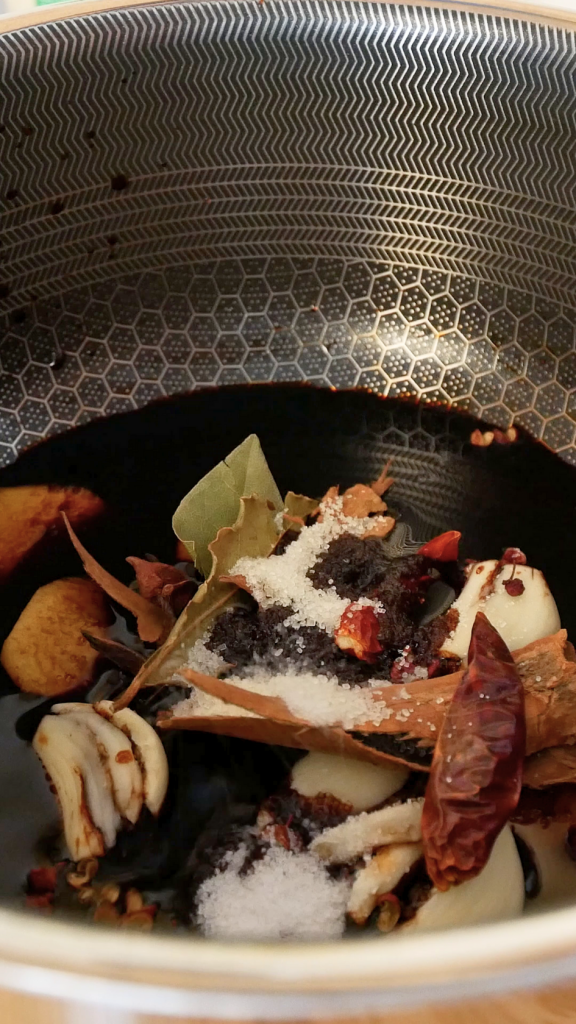
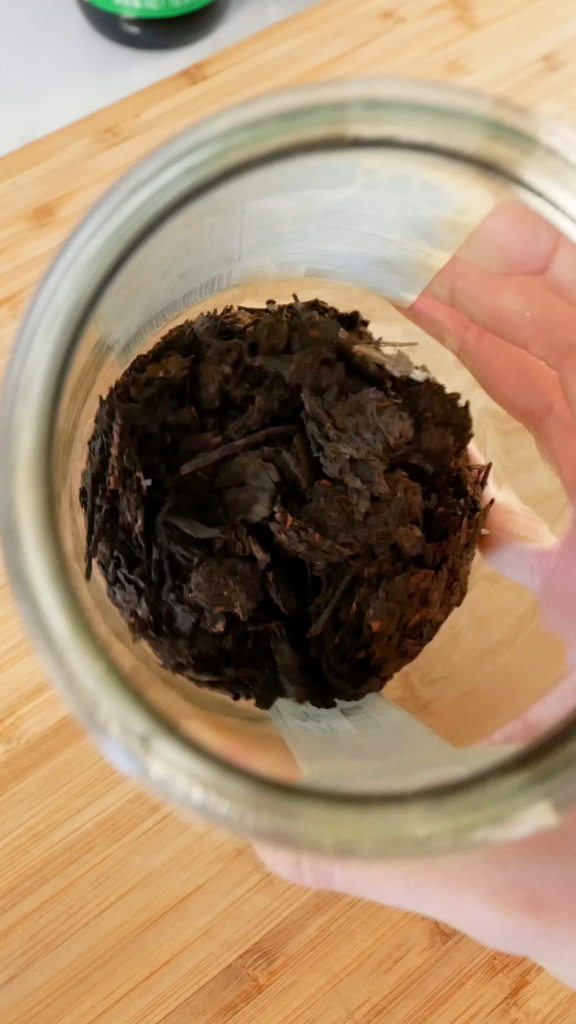
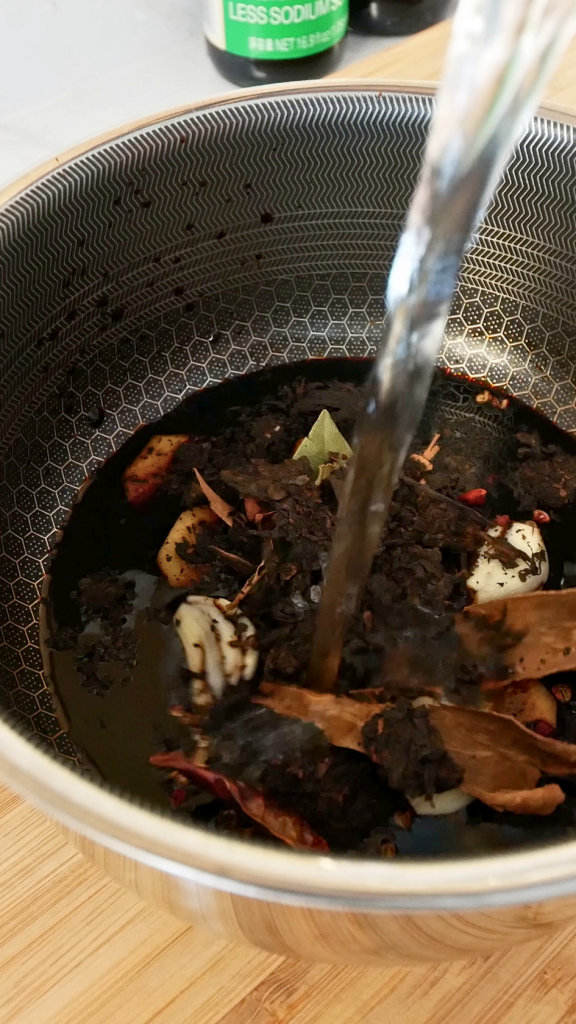
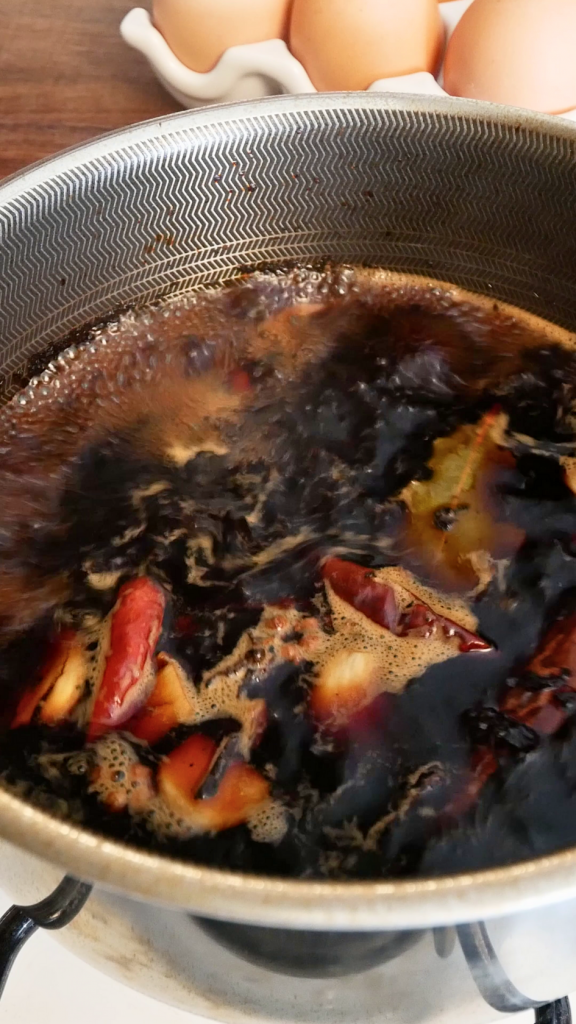
While the eggs are cooling, combine ginger, garlic, star anise, cinnamon stick, bay leaves, tea leaves, Sichuan peppercorns, low sodium light soy sauce, dark soy sauce, sugar, salt, dried chilis, and water in a pot. Bring this mixture to a boil over medium heat and let it simmer for 15 minutes. Once done, set the mixture aside while you finish preparing the eggs.
Step 3: ‘Marble’ the eggs
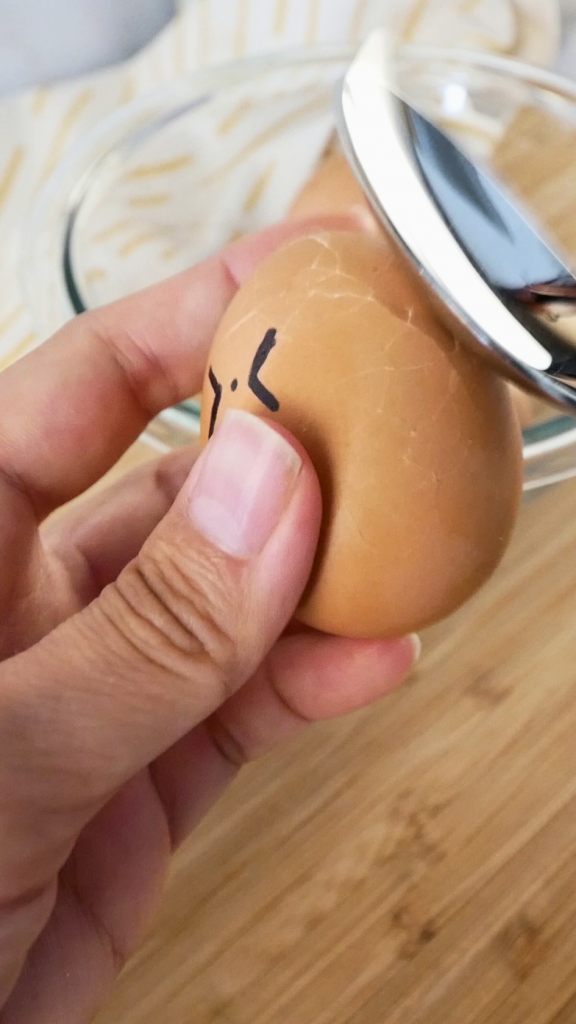
While the soy sauce mixture is cooling, finish preparing the eggs. Using the back of a metal spoon, gently tap the eggs to crack the shell. This will create a ‘marbling’ effect on the eggs while they marinate in the soy sauce mixture.
Step 4: Marinate the eggs
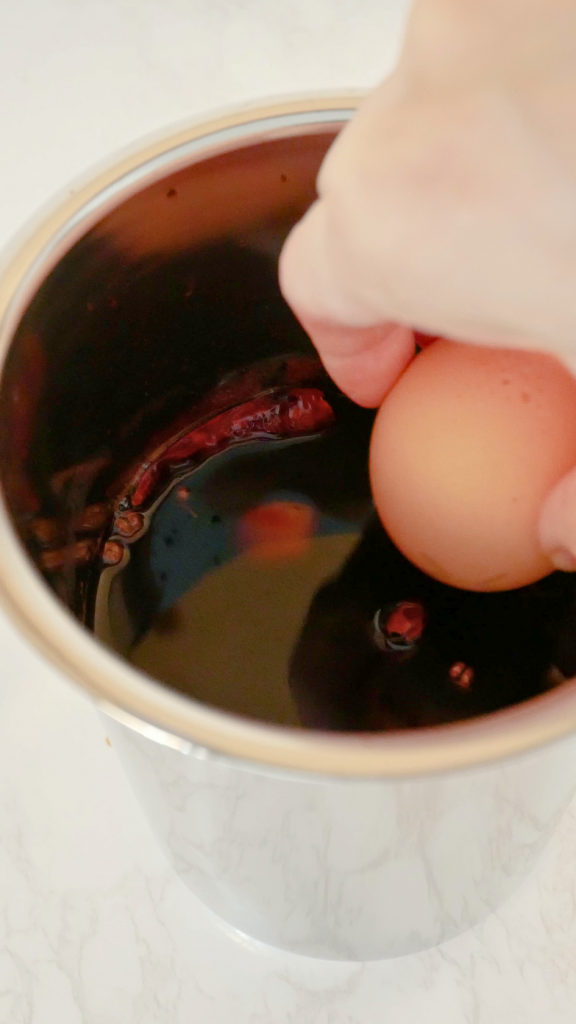
Once the soy sauce mixture is cool, transfer it to a container. If you want to strain the mixture to remove the seasonings and aromatics, now is the time to do so.
Then, add the cracked eggs into the container, making sure it’s fully submerged in the soy sauce mixture. Cover the container and refrigerate for 1 to 4 days.
Step 5: Serve
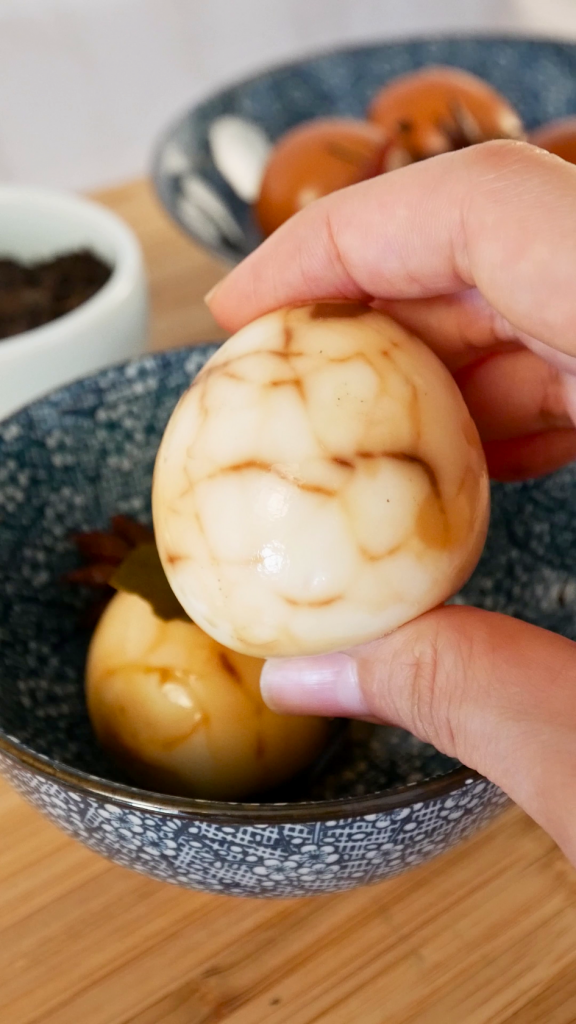
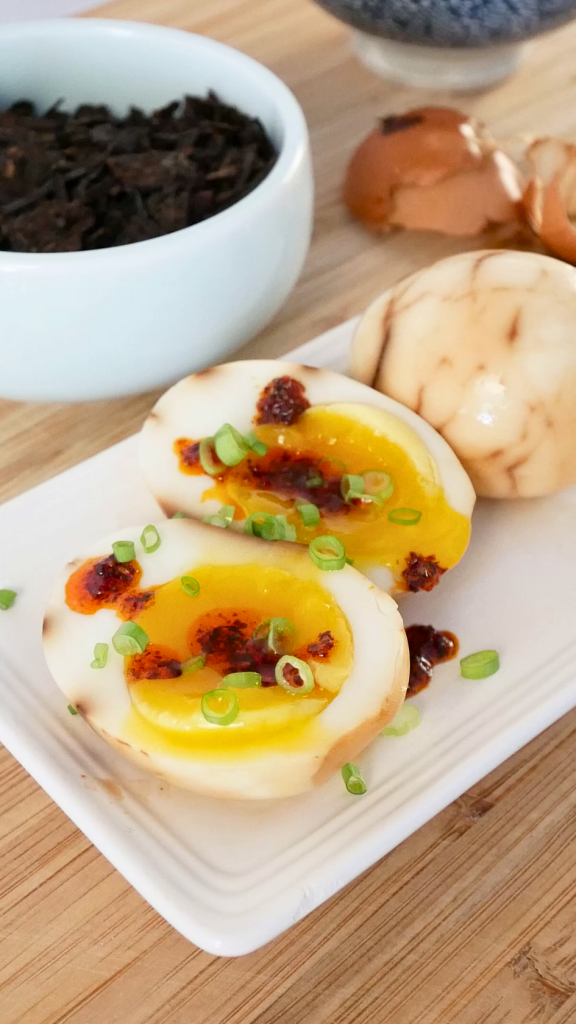
Once you’re ready to eat the eggs, remove the shell and slice them in half. You can enjoy them as is or serve them with your favorite meals!
Cooking Tips for Chinese Tea Eggs
To ensure your Chinese tea eggs turn out fool-proof and delicious every time, here are a few tips and tricks to keep in mind:
- Adjust the cooking time for the egg based on your preferences. If you prefer the eggs to be hard-boiled, boil them for 1 to 2 more minutes before removing them from the heat. If you’d like the eggs to be runnier, reduce the cooking time by 1 minute.
- Adding the dried chilies to the soy sauce mixture is completely optional. But if you want the tea eggs to be spicier, you can add as many chilies as you desire!
- When cracking the shells, take care not to hit them too hard so that they come off the egg. A gentle tap around the surface is enough to create that intricate marbling design.
Frequently Asked Questions
What are red tea leaves?
If you’re in the West, you might refer to red tea leaves as rooibos tea, but in Chinese culture, red tea is actually a type of black tea. Their teas are named after the color of their infusions and although black tea may have dark-colored leaves, its infusions result in a reddish liquid.
I like to use red tea leaves for the soy sauce marinade because it helps produce a beautiful, rich color that stains the eggs. Feel free to use any type of black tea that you desire or have on hand!
Low-Sodium Soy Sauce vs Dark Soy Sauce
Low-sodium soy sauce is a type of soy sauce that has 40% of its sodium removed before fermentation. Dark soy sauce, on the other hand, has a thicker consistency and a slightly sweeter flavor profile due to its sugar content. Although it contains more salt than low-sodium soy sauce, its sugar content balances out its saltiness so it’s not as intense. Aside from flavor, dark soy sauce is often added to dishes to darken their color. This is particularly why I like to use both soy sauces for this tea egg recipe. Not only does it add a depth of flavor, but it also creates a gorgeous ‘marbling’ effect on the eggs.
Can you reuse the soy sauce mixture?
Yes, you can re-use the soy sauce mixture for up to 3 weeks as long as you keep it in the fridge in an airtight container. Once you’ve finished your first batch of tea eggs, bring the soy sauce mixture to a boil then allow it to fully cool. Once completely cooled, marinate the next batch until your desired saltiness. After 3 weeks, discard the soy sauce mixture.
Looking for more easy and delicious egg recipes?
If you’re looking for more delicious egg recipes, I highly recommend checking these dishes out:
1. Soy Cured Egg Yolks – this recipe is similar to Chinese Tea Eggs since they sit in a marinade. With this version, you’ll only cure the raw egg yolks to create a firmer exterior that’s bursting with sweet and savory flavors. Perfect with a bowl (or two) of rice!
2. Chinese Scrambled Eggs with Shrimp – this is a classic Cantonese-style dish served with silky eggs and succulent shrimp. Best part? It only takes 10 minutes to make!
3. Korean Steamed Eggs – if you’re looking to replicate this iconic side dish at home, look no further! All you need is a few eggs and 15 minutes, and you’ll be devouring this in no time.
4. Chinese Tomato Egg Stir Fry – this is a foolproof 20-minute meal that’s both delicious and filling. Perfect with a fresh bowl of hot steamy rice!
5. Chive and Egg Pockets – chive and eggs are a delicious combo that has a beautiful crispy golden exterior and savory vegetable-packed filling. A delicious appetizer that’s great for freezing too!
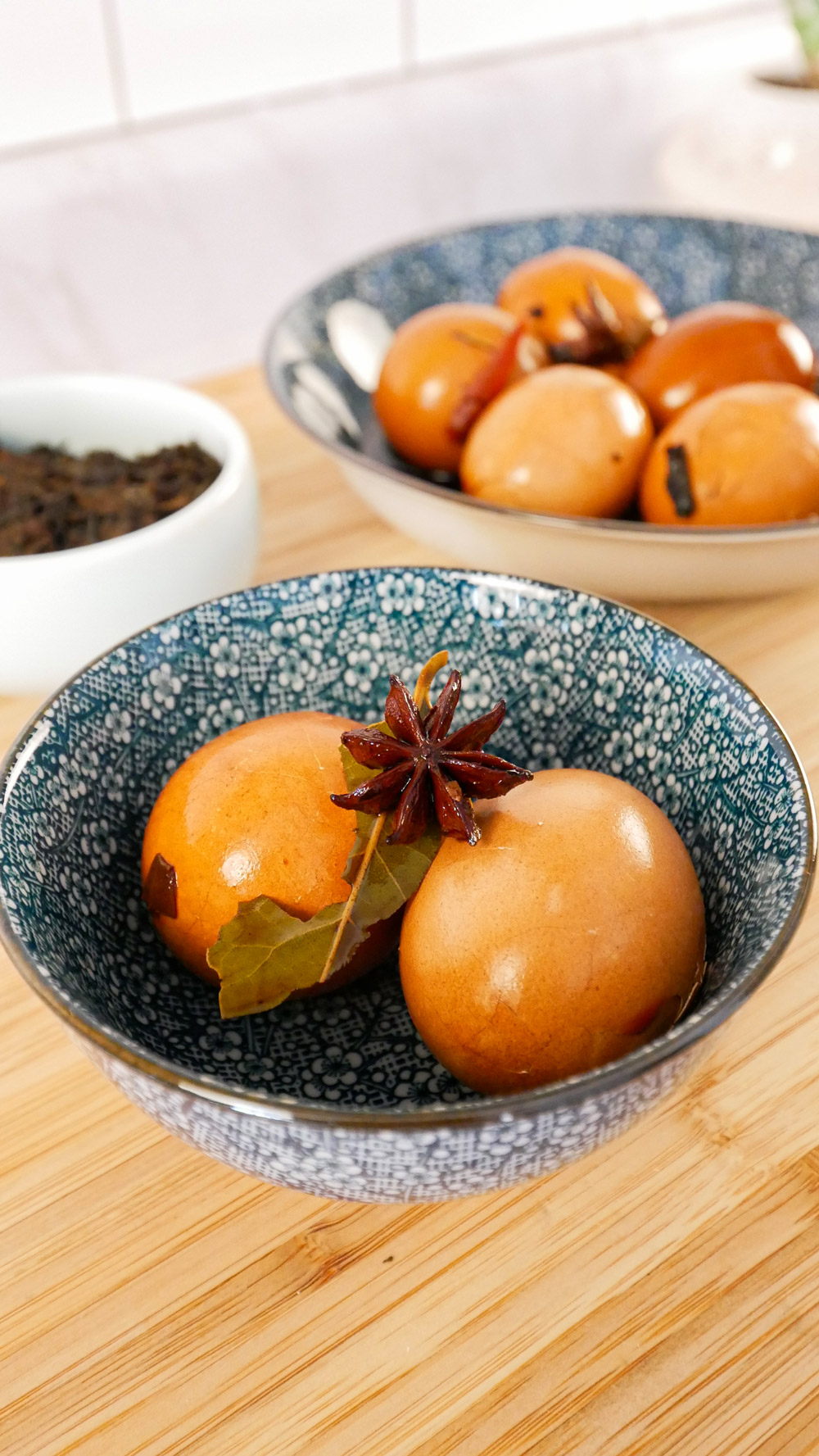
Chinese Tea Eggs
Ingredients
- 12 eggs
- 3 slices ginger
- 3 cloves garlic smashed
- 3 star anise
- 1 cinnamon stick
- 2 bay leaves
- 2 tbsp black tea leaves substitute with Chinese red tea
- 1 tsp Sichuan peppercorns
- 4 tbsp low sodium light soy sauce substitute with 2 tbsp regular soy sauce
- 2 tbsp dark soy sauce
- 2 tsp sugar
- 1/2 tsp salt
- 3 cups water
- 2 dried chili peppers optional
Instructions
- Bring a large pot of water to boil over medium heat. Add eggs and boil for 7 minutes or to your desired doneness.
- Immediately transfer the eggs into an ice bath or into a bowl under running cold water.
- While the eggs are cooling, prepare the marinade. In a pot, combine ginger, garlic, star anise, cinnamon stick, bay leaves, tea leaves, Sichuan peppercorns, low sodium soy sauce, dark soy sauce, sugar, salt, dried chili peppers, and water.
- Bring the mixture to a boil over medium heat. Let this simmer for 15 minutes. Remove from the heat then set aside to cool completely.
- While the soy sauce marinade is cooling, finish prepping the eggs. Using the back of a metal spoon, gently tap around the shell and slightly crack the egg. This will create a 'marbling' effect on the eggs after it marinates in the soy sauce mixture.
- Once the soy sauce mixture has cooled, strain the liquid. Then, transfer it to an air tight container.
- Place the cracked eggs into the container with the soy sauce mixture. Cover and refrigerate for at least 1 day or up to 4 days.
- Enjoy as is or as a topping with your favorite meals!
Pin & save this recipe for later!
